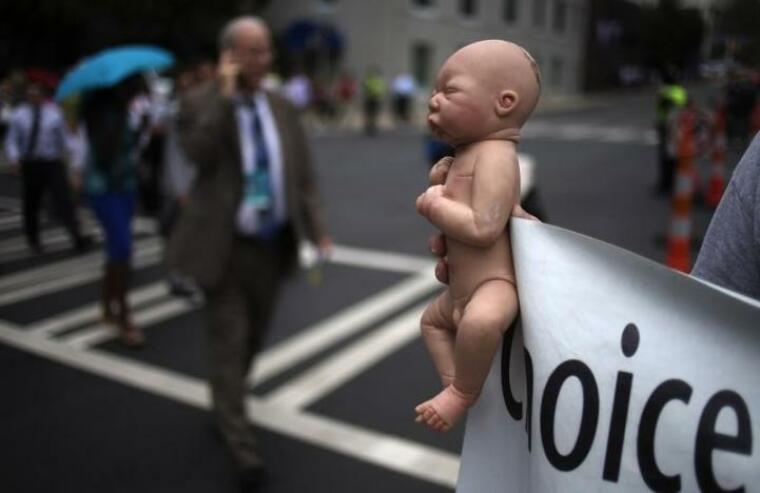Satanic Temple challenges Texas law that requires proper burial for aborted babies

The Satanic Temple has stated that it will not comply with the new Texas regulations which require aborted babies to be buried or cremated.
Last week, the Texas Department of Health and Human Services finalized the rules that would require abortion facilities to bury or cremate aborted babies instead of throwing them in landfills or garbage disposal.
The Temple claimed that its objection to the new rule was based on religious grounds.
"The Satanic Temple believes burial rites are a well-established component of religious practice. This is undisputed in the entirety of US legal history," the group stated on its website.
"In addition, members of The Satanic Temple believe in the inviolability of the body and, as such, these rules contradict our fundamental beliefs," it added.
The new rules, which was proposed back in July, will take effect on Dec. 19. It will affect hospitals and abortion centers, but it does not apply to women who miscarry or perform chemical abortions at home, according to LifeSite.
"Clearly, the State of Texas has no compelling reason because these rules were not enacted to promote health and safety, but rather to harass and burden women who terminate their pregnancies," the statement continued.
Texas HHS spokesman Bryan Black said that the new regulations were created in order "to ensure Texas law maintains the highest standards of human dignity."
The Satanic Temple maintained that its members are not required to comply with the law, but the group will need legal support to protect its members' rights.
Some pro-choice advocates were concerned that the new regulation would add to the cost of abortions but the HHS stated that the cost would not be more than what the abortion facilities already pay to dispose of the aborted babies.
Lawyers with the Center for Reproductive Rights have suggested that the new rules are likely to be challenged in court. The lawyers stated in a letter to health officials that the proposal "will almost certainly trigger costly litigation."
 Christians don't have to affirm transgenderism, but they can’t express that view at work: tribunal
Christians don't have to affirm transgenderism, but they can’t express that view at work: tribunal Archaeology discovery: Medieval Christian prayer beads found on Holy Island
Archaeology discovery: Medieval Christian prayer beads found on Holy Island Presbyterian Church in America votes to leave National Association of Evangelicals
Presbyterian Church in America votes to leave National Association of Evangelicals Over 50 killed in 'vile and satanic' attack at Nigerian church on Pentecost Sunday
Over 50 killed in 'vile and satanic' attack at Nigerian church on Pentecost Sunday Ukrainian Orthodox Church severs ties with Moscow over Patriarch Kirill's support for Putin's war
Ukrainian Orthodox Church severs ties with Moscow over Patriarch Kirill's support for Putin's war Islamic State kills 20 Nigerian Christians as revenge for US airstrike
Islamic State kills 20 Nigerian Christians as revenge for US airstrike Man who served 33 years in prison for murder leads inmates to Christ
Man who served 33 years in prison for murder leads inmates to Christ


 Nigerian student beaten to death, body burned over ‘blasphemous’ WhatsApp message
Nigerian student beaten to death, body burned over ‘blasphemous’ WhatsApp message 'A new low': World reacts after Hong Kong arrests 90-year-old Cardinal Joseph Zen
'A new low': World reacts after Hong Kong arrests 90-year-old Cardinal Joseph Zen Iran sentences Christian man to 10 years in prison for hosting house church worship gathering
Iran sentences Christian man to 10 years in prison for hosting house church worship gathering French Guyana: Pastor shot dead, church set on fire after meeting delegation of Evangelicals
French Guyana: Pastor shot dead, church set on fire after meeting delegation of Evangelicals ‘Talking Jesus’ report finds only 6% of UK adults identify as practicing Christians
‘Talking Jesus’ report finds only 6% of UK adults identify as practicing Christians Mission Eurasia ministry center blown up in Ukraine, hundreds of Bibles destroyed: 'God will provide'
Mission Eurasia ministry center blown up in Ukraine, hundreds of Bibles destroyed: 'God will provide' Church holds service for first time after ISIS desecrated it 8 years ago
Church holds service for first time after ISIS desecrated it 8 years ago Burger King apologizes for 'offensive campaign' using Jesus' words at the Last Supper
Burger King apologizes for 'offensive campaign' using Jesus' words at the Last Supper Uganda: Muslims abduct teacher, burn him inside mosque for praying in Christ’s name
Uganda: Muslims abduct teacher, burn him inside mosque for praying in Christ’s name